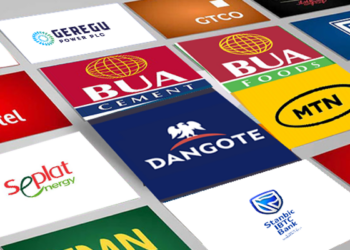As Nigerian equities surge, driven by substantial increases in the share prices of SWOOT companies and Dangote Cement’s recent feat of crossing the N10 trillion market capitalization mark, the question looms large: can MTN Nigeria and Airtel replicate such success?
The Nigerian equity market has been on an impressive trajectory, evident in the growth of the All-Share Index (ASI). In 2023 alone, the ASI soared by 45.90%, a significant leap from the previous year’s 19.98%. Continuing into 2024, the ASI witnessed a further appreciation, reaching a remarkable 102,401.88 (+252.95) points or 36.95% YtD as of last trading on Monday, January 29, 2024.
This surge was expected to mirror growing investor confidence and interest in Nigerian equities, driven by factors such as improved economic performance, favorable market conditions, or enhanced financial performance of the listed companies.
However, the growth in the Nigerian equity market appears to be primarily driven by the growth in number and the surge in the share price of large-cap companies.
For instance, the number of SWOOT (Stocks Worth Over One Trillion Naira) companies has risen from 8 in 2023 to 12 as of the close of trading on Monday, January 29, 2024.
These SWOOT companies collectively command an increased total market capitalization of N46.35 trillion, which represents about 81% of the total market capitalization.
Apart from the banking sector SWOOTs, which have relatively higher levels of free float, many other sector SWOOTs exhibit low free float percentages. Take, for example, BUA Cement, where the free float of 605.98 million units represents just 1.79% of the total outstanding shares.
While the tight ownership structure of some of these large-cap companies can heavily influence market dynamics, it’s crucial to analyze the factors that could potentially propel Airtel and MTN Nigeria towards achieving Dangote Cement’s N10 trillion market capitalization milestone.
Before the surge in Dangote Cement’s share price, Airtel Africa was the most valuable stock with a market capitalization of N7.52 trillion. Currently, MTN Nigeria is the fourth most valuable company with a market capitalization of N5.98 trillion.
Over the past two years, Airtel Africa’s share price has experienced healthy growth, averaging 43% annually, while MTN Nigeria has seen a 16% yearly increase. However, in the current year, Airtel has gained 6% YTD, while MTN Nigeria has gained 11%, indicating gains of N425 billion and N609 billion, respectively.
Based on their current market capitalization and assuming outstanding shares remain constant, Airtel would need to see its share price grow by 33% to reach the N10 trillion market capitalization mark, while MTN Nigeria would require its share price to grow by 67% to achieve the same milestone.
While Airtel could potentially replicate its share price performance of 72% in 2022 to reach the N10 trillion mark, MTN Nigeria would need to outperform its average yearly growth of 37% since listing in 2019.
Achieving the growth aspirations outlined necessitates a sustained level of investor confidence. This confidence is predicated on several factors, including improved operational and financial performance, strategic investments, and favorable market conditions.
Fundamentals
Over the past five years, both MTN Nigeria and Airtel Africa have demonstrated consistent earnings growth, with respective five-year compound annual growth rates (CAGR) of 19% and 24%.
However, recent challenges stemming from macroeconomic headwinds and Naira devaluation have led to a decline in profitability for both companies.
During the half-year period ending September 2023, Airtel Africa reported a significant 97.7% decline in pretax profit and incurred a loss after tax of $13 million. Similarly, MTN Nigeria experienced a 42% decline in pre-tax profit and a 45% decline in post-tax profit.
Such declines raise concerns about investor confidence and may prompt reevaluation of future earnings potential, impacting market capitalization targets.
Despite these challenges, the market continues to anticipate growth from both MTN Nigeria and Airtel Africa, as evidenced by their relatively high price-to-earnings ratios.
MTN currently trades at a price-to-earnings multiple of 27.18x, while Airtel Africa’s multiple stands at 19.9x. These elevated multiples reflect optimistic investor sentiment regarding the growth potential of both companies, possibly driven by expectations of expansion into new markets, technological advancements, or other growth catalysts.
It is also plausible that the market’s elevated expectations could be partly attributed to their dividend policies.
MTN Nigeria has consistently distributed dividends to its shareholders since its 2019 listing, achieving a robust Dividend Compound Annual Growth Rate (CAGR) of 38%.
Similarly, Airtel Africa has a track record of regularly rewarding investors. In 2023, the company raised its dividend payout by 9% to 5.45 $cents per share, compared to 5 $cents in 2022.
This provides relatively healthy dividend yields, adding flavour to the share price gain for an increased total return and may attract a broader investor base, including income-oriented investors and institutional funds.
Overall, while MTN Nigeria and Airtel have demonstrated potential, achieving the N10 trillion milestone hinges on navigating market dynamics, sustaining financial performance, and restoring investor confidence amidst economic headwinds.
Disclaimer: The author(s) of this article may hold shares in, or have buying and selling intentions for, any or all of the stocks mentioned in this article. This story is for information purposes only and should not be considered as an investment advice or action. Our readers are encouraged to seek professional guidance before making any investment decisions.























